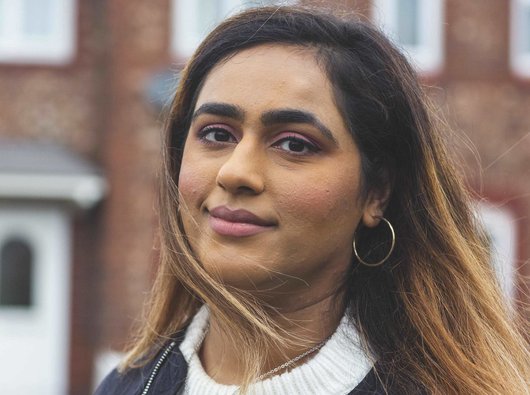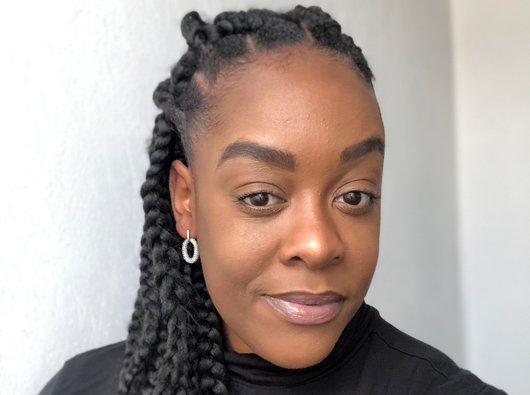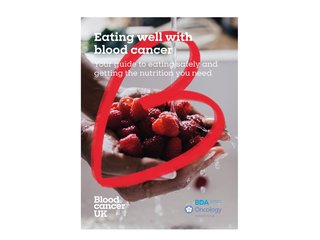Eating problems
Blood cancer and treatment side effects can sometimes make it difficult to eat and enjoy food. Your hospital team can help, and there are things you can try yourself to make eating easier and more enjoyable.
Feeling sick
Feeling sick and being sick are common side effects of blood cancer treatment that can affect your ability to eat. There are anti-sickness treatments that can be very effective, so speak to your hospital team if you’re worried about sickness.
If you’re feeling sick, here are some tips that may help you to keep eating:
- Try eating something dry and plain, like toast, crackers or a biscuit, before you get up in the morning. Sometimes being hungry can actually make you feel more sick.
- Chew your food well and sip drinks slowly.
- If possible, ask someone else to cook for you if cooking smells make you feel sick.
- Try eating cold foods, as these tend to smell less than hot foods.
- Some people find peppermint tea, peppermints, ginger beer or ginger biscuits helpful.
- Try to make sure you drink enough fluids, even if you can’t manage food.
- Avoid fried, spicy and very sweet foods. Plain, bland foods may be easier to eat.
- Distract yourself while eating by listening to music, watching TV or talking to someone on the phone.
- Sit upright while eating and for 30 minutes afterwards. Gravity will help your digest your food.
"I would come home from chemo and have a pint of ginger tea and nibble on ginger biscuits to help with the nausea. I can’t even look at a ginger biscuit now, but at the time it really helped."
Hinna, diagnosed with blood cancer in 2015.

Loss of appetite
Losing your appetite for food can be a symptom of blood cancer and a side effect of treatment. Here are some things that may help:
- Your appetite may come and go, so make the most of the times when you feel like eating.
- Keep small portions of foods you enjoy in your fridge or cupboard, ready for when you feel like eating.
- Try regular small meals. Eating five or six small meals might be easier than having a few bigger meals.
- Use smaller plates to make portions feel less overwhelming.
- Try new foods and flavours – you may find you like things you don’t usually eat.
- Don’t worry if you’re not eating ‘normal’ foods at ‘normal’ times. If you fancy cereal at midnight, or ice cream in the morning, enjoy it!
- While your appetite is low, it’s healthy to have high calorie and high fat foods, as they have lots of energy. If you avoided them in the past, allow yourself to have them now.
- Some fresh air or a short walk before eating might stimulate your appetite.
- If you drink alcohol, having a small amount of your favourite alcoholic drink before eating might boost your appetite. But check with your doctor if it’s safe to have alcohol with your treatment.
- If you don’t feel up to meals, try having nutritious snacks throughout the day. Keep some with you at all times so you’ve got a snack to hand whenever you feel like eating. See our snack ideas below.
Savoury snacks
- sandwiches
- cheese and crackers, cheese straws and cubes
- crisps, nuts, savoury biscuits and plantain chips
- small pieces of pizza, flans or sausage rolls
- cut up vegetables with dips like hummus and tzatziki
- avocado slices
- boiled egg with crackers
- bread dipped in olive oil
- brioche bread roll
- samosas, pakoras and bhajis.
Sweet snacks
- biscuits, cakes, muffins or scones
- ready-made desserts, such as full-fat yoghurt, rice pudding, crème caramel, trifle and mousse
- fun-sized chocolate bars
- slices of Jamaican bun and cheese
- croissants, toast with butter and jam
- bowl of breakfast cereal with full fat milk
- slices of apple with nut butter
- trail mix of coconut, raisins and nuts
- flapjack
- malt loaf with butter
- seed or nut bars
- fried sweet dumplings.
"What helped me was eating little and often, so I wasn’t overwhelming myself with a big plate of dinner. I liked having a plate of 'picky bits' with all different flavours and textures."
Simone, living with blood cancer since 2018.

Changes to your sense of taste
Some blood cancer treatments can cause changes to the way food tastes. Food might lack flavour, or taste bitter, too sweet or metallic. Here are some tips that may help you enjoy food if your sense of taste has changed:
- Experiment with different flavours and textures to see what works for you.
- Avoid eating foods that taste odd, but try them again after a few weeks, as your taste is likely to change.
- If everything tastes the same (bland), try adding lots of extra flavour with garlic, lemon juice, herbs and spices.
- Try marinades or dry rubs to add extra flavour to meat, fish or vegetables.
- Try adding extra spice with chillies or hot sauce (although be careful if you have a sore mouth, as spicy food could be painful).
- Rinse your mouth with water before and after eating.
- If tea and coffee taste bad, you could try herbal or fruit teas instead.
- Keep your mouth clean and brush your teeth well.
- If food tastes metallic, metal cutlery might make it worse. Try using plastic cutlery instead. Avoid food that is stored in cans.
- If food tastes too sweet, try adding salt, vinegar or lemon juice to tone it down. Chilling the food may also help.
- If food tastes too salty, try adding sugar or sweet sauce like tomato ketchup.
"You don’t realise until you can’t enjoy food, what a big part it plays in life. Not only the pleasure, but socially as well. It’s OK to be upset about it, and ask for help."
Stephen, living with blood cancer since 2019.

Sore mouth
Some blood cancer treatments can damage the cells in your mouth and throat. This is called mucositis. We have more information about mucositis, including treatments and self-help tips.
If a sore mouth is making it difficult to eat, here are some things that could help:
- Choose soft foods, like yoghurt, soft breads and scrambled eggs.
- Soften foods with sauces and gravy.
- Finely shop meat and vegetables and cook them for longer than usual to soften them.
- Avoid rough or hard foods like crisps and crusty bread.
- Avoid spicy or acidic foods.
- Avoid food that is too hot, as this can be sore to eat.
- Sucking ice lollies or drinking cold milkshake can be soothing when you have a sore mouth.
"I learned very quickly that I couldn’t have anything acidic or too hot. I lived off really cold vanilla milkshakes. They were soothing and had the calories I needed."
Kat, diagnosed with blood cancer in 2012.

Losing weight
Losing weight can be a symptom of blood cancer, and can also happen because of treatment side effects like sickness, loss of appetite and diarrhoea.
It’s important to tell your hospital doctor, GP or clinical nurse specialist if you’re losing weight. They can refer you to a dietitian for advice. They might also prescribe high calorie drinks or supplements to give you extra nutrition.
These are just a few tips for getting extra calories if you’re struggling to eat:
- Add extra calories and protein to any food you eat by adding extra olive oil, nuts, cream, butter, milk, sugar, honey or cheese.
- Eat puddings and deserts. Foods with fat and sugar are a good source of calories.
- Drinks might be easier to manage than meals. Try smoothies, lassis and milkshakes. You can make your own with frozen or fresh fruit. Make sure you include some full fat milk, yoghurt or ice cream to pack in more calories.
Macmillan Cancer Support has advice about building up weight when you have cancer.
Constipation
Constipation can be a side effect of blood cancer treatment, and can also be caused by some anti-sickness drugs and painkillers. Having constipation can make you feel sick and cause you to lose your appetite.
These self-help tips can help prevent or relieve constipation.
- Drink eight to 10 cups of fluid each day. Both hot and cold drinks will help.
- Eat foods high in fibre, like fresh fruit and vegetables, wholewheat breakfast cereals, lentils, beans and brown rice.
- Prune juice, prunes, fig syrup or dried apricots may work as a natural remedy to relieve constipation.
- Do some gentle exercise each day – it can help to keep your bowels moving.
If these things don’t help, speak to your doctor or clinical nurse specialist. They can help prescribe treatment to help.
"I've tried to get more fibre into my diet by eating some raw veg every day. Since I started that my bowel habits have really improved - everything's just running a bit smoother there."
Nigel, living with blood cancer since 2015.

Getting help for eating problems
You don’t have to cope alone with eating problems. If you are having any difficulties with eating speak to your hospital team of GP. Often they can recommend treatment to help with the cause of eating problems, for example prescribing anti-sickness medicine or treatment for a sore mouth.
You can also ask your hospital doctor, CNS or GP for a referral to a dietitian. Dietitians have experience in supporting people going through cancer treatment with eating problems.
You can also get support and tips from other people with blood cancer on the Blood Cancer UK Forum.
Many thanks to specialist haematology dietitians Natasha Jones and Victoria Mace for checking the content on this page.
Funding disclosure
The following pharmaceutical companies helped fund an earlier version of this information, but had no input into the content or direction of the project: Janssen-Cilag Ltd.
Read about how we work with the pharmaceutical industry.

Your guide to eating well
Get your free booklet all about eating well with blood cancer. Includes information on having a balanced diet, food safety and tips to help with eating problems.
